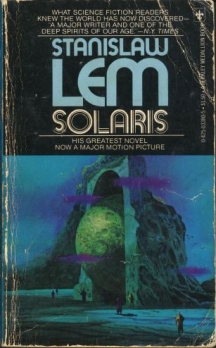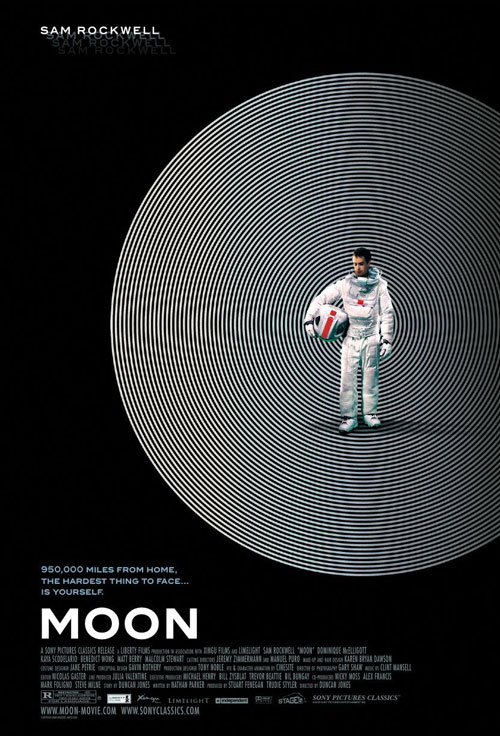Watching, owning, looking at, listening to, thinking about, and at last finally reading Solaris
 I adore Stanisław Lem. And for ages I’ve wanted to read his masterpiece Solaris (1961), but haven’t, even though I own a couple of beat-up mass paperback copies, because the only English translation available has been the Joanna Kilmartin and Steve Cox 1970 adaptation, which they “translated from the French”—from Jean-Michel Jasiensko’s 1966 translation—and which Lem himself purportedly disliked, and which my Polish friends have repeatedly told me is terrible, and which I’ve nonetheless tried to read on a number of occasions, but was never able to get more than a few pages into before I’d give up and instead rewatch Andrei Tarkovsky’s 1972 cinematic adaptation (which Lem also openly disliked; the man wasn’t afraid to voice his opinions). (And even with that film, it wasn’t until I saw Criterion’s 2002 DVD release that I realized how magnificent it was; the 1997 VHS release was washed out and split across two tapes, and I think even pan-and-scanned, rendering it pretty underwhelming.)
I adore Stanisław Lem. And for ages I’ve wanted to read his masterpiece Solaris (1961), but haven’t, even though I own a couple of beat-up mass paperback copies, because the only English translation available has been the Joanna Kilmartin and Steve Cox 1970 adaptation, which they “translated from the French”—from Jean-Michel Jasiensko’s 1966 translation—and which Lem himself purportedly disliked, and which my Polish friends have repeatedly told me is terrible, and which I’ve nonetheless tried to read on a number of occasions, but was never able to get more than a few pages into before I’d give up and instead rewatch Andrei Tarkovsky’s 1972 cinematic adaptation (which Lem also openly disliked; the man wasn’t afraid to voice his opinions). (And even with that film, it wasn’t until I saw Criterion’s 2002 DVD release that I realized how magnificent it was; the 1997 VHS release was washed out and split across two tapes, and I think even pan-and-scanned, rendering it pretty underwhelming.)
Today I noticed that there’s a new and direct translation of Solaris available, albeit only electronically (and as an audio book). It’s by Bill Johnston, “a professor of Comparative Literature at Indiana University.” (The audio book version is read by Alessandro Juliani, who I see played Lt. Felix Gaeta on Battlestar Galactica.) … So has anyone out there read it, or listened to it? (This new Solaris, not BG.) From what I can see online, it certainly looks more promising. Here’s Kilmartin/Cox:
At 19.00 hours, ship’s time, I made my way to the launching bay. The men around the shaft stood aside to let me pass, and I climbed down into the capsule. Inside the narrow cockpit, there was scarcely room to move. I attached the hose to the valve on my space suit and inflated it rapidly. From then on, I was incapable of making the smallest movement. There I stood, or rather hung suspended, enveloped in my pneumatic suit and yoke to the metal hull.
And here, by way of contrast, is the start of Johnston’s new edition:
At nineteen hundred hours ship’s time I climbed down the metal ladder past the bays on either side into the capsule. Inside, there was just enough room to raise my elbows. After I attached the end of the cables into the port jutting from the side of the capsule, my space suit filled with air and from that point on I couldn’t make the slightest movement. I stood, or rather hung suspended, in a bed of air, all of one piece with my metal shell.
Finally, while on the subject of Solaris, has anyone out there seen that other movie version that got made? You know—the one by Lidiya Ishimbayeva and Boris Nirenburg?
Thinking about all these different editions of Solaris got me wondering what the original Polish movie poster for Solaris looked like. If you’ve become curious as well, then wonder no longer:
Looking at it in turn got me wondering whether someone clever didn’t have that image in mind when designing the poster for Moon:
(Or the Death Star.)
Update: Joseph Scapellato just informed me that Bill Johnston also translated Witold Gombrowicz’s Bacacay.
Tags: Alessandro Juliani, Andrei Tarkovsky, Battlestar Galactica, Bill Johnston, Boris Nirenburg, criterion collection, Jean-Michel Jasiensko, Joanna Kilmartin, Moon, Solaris, Stanislaw Lem, Steve Cox



I read that old translation of Solaris – it seemed okay to me when I did. (I wasn’t comparing the experience to having read the book in Polish, but rather, in the light of it being a translation.) A new translation – from Polish! mirabile dictu! – does sound like a welcomely rational thing.
It’s an interesting history – translation of primary texts from secondary, interpolative languages. (Shakespeare’s ‘Plutarch’ – his source for Antony and Cleopatra, Julius Caesar, Coriolanus, etc. – was gotten from near-contemporary French, not late-Hellenistic Greek.) You might add an Anglophone American’s viewing of Tarkovsky’s Solaris to such a genealogy, no? — it being a Russian movie of a Polish novel.
I agree with Soderberg in that his version was closer to the novel – eh, the one that I read – than Tarkovsky’s. I also think that using the sheen of ‘Hollywood’ glamor to communicate the astronaut’s dilemma was an interesting, to-me successful, choice away from (or added to) Lem.
The Moon poster might’ve been inspired by the Polish Solaris poster… but the concentric circles in the Moon poster aren’t punctuated by rays and a concentric grid, which prominently characterize the image in the Solaris poster. The Moon image looks more like a CD/DVD frisbee; I think that’s probably the not-too-subliminal reference the Moon marketers were going for. I was greatly impressed by that movie.
Very interesting ideas, deadgod. One of my interests is definitely in how primary texts “fan out” over time, creating little families of derivative works. Including reviews, fan-art, etc.
I was half-joking about the Moon connection. I liked that film a great deal when I saw it, and it’s only grown in my memory ever since.
Bill Johnston’s Bacacay is breathtaking. I’ll read (listen) to anything BJ translates.
My renewed interest in Solaris was inspired by references in a Rumpus Poetry Book Club titled. I rewatched the original film a few weeks ago, and have the recent remake ready to watch this weekend. I read some translation (don’t know which, off the library bookshelf) many years ago and thought, meh. I have just downloaded the Kindle version and can’t wait to dive into it.
It was probably the Kilmartin/Cox translation; to my knowledge that’s the only English-language version that’s existed until Johnston’s.
Not being fluent in Polish, my closest reference is the original Soviet film. So far the characters and atmosphere are developing very closely to the film. I used to consume hard science fiction like Pop Tarts when I was young and Lem (in this translation) is a master at creating a credible scientism. The writing is as sparse and tight and atmospheric as the Station. It feels very modern in the post-Carver sense, delivering the fantastic with a beautiful and fluid economy I hate e-Readers (although I found myself download some reading since I returned to college to supplement the hard copies for searching, etc.) I wish to hell I had a hard copy. If you’re a fan of good old hard sci-fi you want to download this book.
I found the 1968 movie (or maybe mini-series?) and watched it a while back. It followed the narrative pretty closely, I will have to watch it again to be thorough as I still haven’t read the Johnston translation. I am such a huge a fan of Solaris it borders fetishism. I like the book for its allegories, its philosophical ideas and its very critical geopolitical subtext. Really, really great stuff.
Actually I think neither Tarkovsky or Soderbergh nails Lem’s philosophy properly, the films are adaptations and work well in their own right but somehow do not address Lem’s concept of selective repression of memory and post-colonialism and as much as I’d expected. I did miss the planet’s ‘voice’ in Soderbergh’s version. It was more of a backdrop, while in the book I find it’s what drives the narrative forward.
The Tarkovsky version was TERRIBLE. I haven’t seen the 2002 movie, but the 1972 one is a complete butchering of the original ideas from the book. It has some beautiful filmmaking, but 3/10 is the best I can give, and *that* is being generous.
Thankfully, the 1968 movie exists and is a HELL of a lot better.